 |
 |
 |
| |
Tenofovir for HBV/HIV Coinfection
|
| |
| |
"Randomized Phase II Controlled Trial Comparing the Efficacy of Adefovir Dipivoxil and Tenofovir Disoproxil Fumarate for the Treatment of Lamivudine-Resistant Hepatitis B Virus in Subjects Who Are Co-infected With HIV"
Reported by Jules Levin
This ACTG Study 5127 is the first randomized, controlled trial comparing tenofovir to adefovir in co-infected patients. 5-10% of HIV-infected patients are HBV-infected. HIV can accelerate HBV disease progression, as HIV can accelerate HCV disease progression.
The study enrolled 52 co-infected patients who were on stable combination antiretroviral therapy: 25 received adefovir & 27 tenofovir as part of a HAART regimen. Patients also received a placebo. At baseline 70-80% of the subjects had HIV RNA below 400 copies/mL and 98% had compensated liver disease. This study is a non-inferiority study; ie, the study was designed to show that tenofovir was not inferior to adefovir.
The subjects were randomized to tenofovir 300 mg plus placebo or adefovir 10 mg plus placebo daily for up to 96 weeks, and underwent laboratory evaluations weekly. 75% of the subjects were lamivudine-experienced.
The study was stopped after 52 of the 60 patients were enrolled because the primary study endpoint was met, showing that tenofovir was not inferior to adefovir and in fact decreased HBV DNA more than adefovir.
At 48 weeks, the mean log10 time-weighted average change in HBV DNA from baseline was -4.03 in the tenofovir group and -3.12 in the adefovir group. Efficacy beyond week 48 and safety study results, including the incidence of ALT flares, are reported below. On treatment flares occurred but were reported not associated with clinical decompensation. Suppression of HBV DNA was accompanied by improved ALT.
Gilead Sciences is planning further study of tenofovir for HBV.
Primary Study Endpoint
--To assess the non-inferiority of TDF 300 mg daily compared to ADV 10 mg daily with respect to serum HBV DNA utilizing DAVG48
--DAVG48 is the time-weighted average change from baseline in serum HBV DNA up to week 48
--Non-inferiority was defined with a tolerance of -1 log10 copies/mL
| |
| |
| |
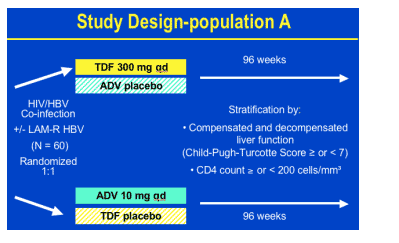 |
|
| |
| |
INCLUSION CRITERIA:
HBsAg positive
Serum HBV DNA >100,000 c/ml by Roche Amplicor Cobas PCR
Population A: HIV on stable ART with plasma RNA <10,000 c/ml within 12 weeks
prior to study entry
Population B: plasma HIV RNA >10,000 c/ml
No HCC, HCV
BASELINE DEMOGRAPHICS
TDF (n=27), ADV (n=25)
Mostly men in this study
Median age: 40 in TDF arm, 47 in ADV arm
Caucasian: 56%
Black: 32%
Other: 8-11%
Median CD4 count: 422-486
HIV RNA <400 c/ml: 80% ADV, 70% TDF
| |
| |
| |
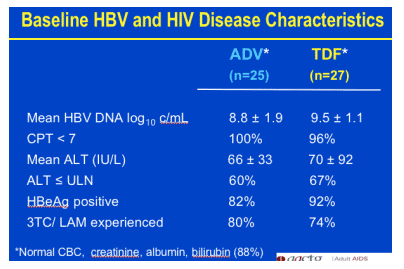 |
|
| |
| |
At SMC (subject Monitoring Comm), 67% had completed week 48.
4 discontinued study prior to week 48:
--1 TDF at week 20
--3 ADV at week 9, 30, 32
| |
| |
| |
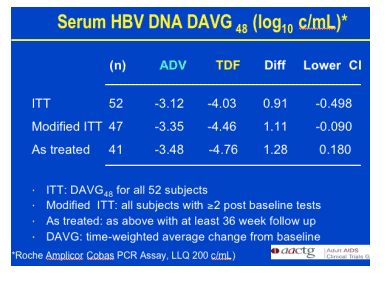 |
|
| |
| |
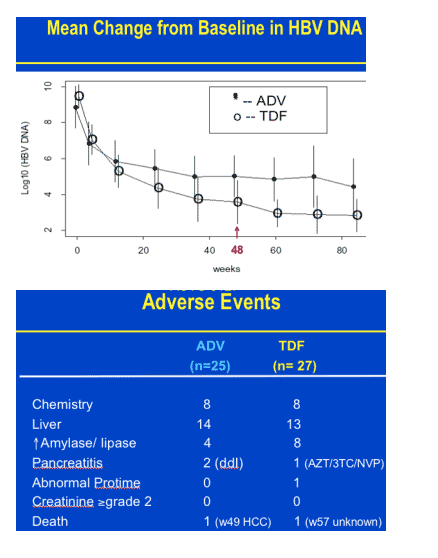 |
|
| |
| |
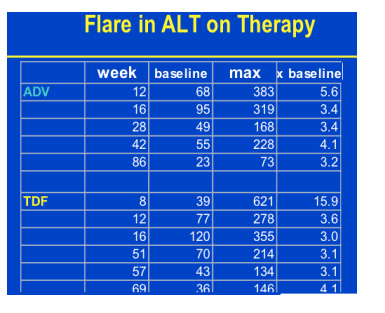 |
|
| |
| |
|
 |
 |
|
|